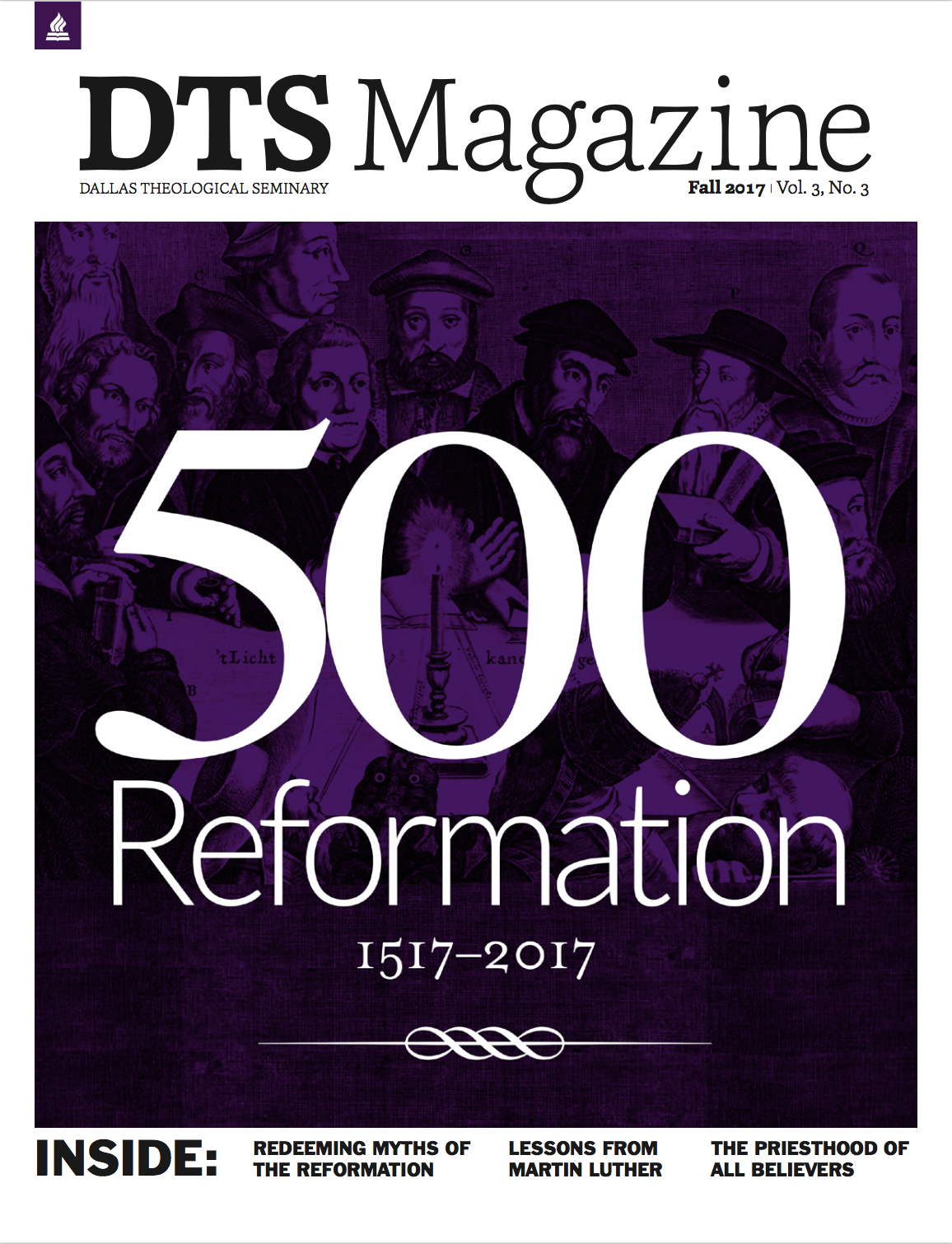6 Lessons from the Legacy of Martin Luther

Would Martin Luther—given his personality and prejudices—be acceptable on any modern university faculty?
Reformation scholar Heiko Oberman raised this interesting question in the conclusion of his work on the heralded reformer, Luther: Man Between God and the Devil. Oberman’s conclusion is that Luther would not stand a chance, because many of his late medieval values, such as his strident belief in the realities of the unseen, would be viewed as archaic and nonsensical to a postmodern audience. Furthermore, a psychological battery of tests would have eliminated any vestige of chance. His fear of the Lord and a very real perception of the realities of the demonic would lead to a diagnosis of either neurosis or psychosis caused by childhood trauma.
With this said, is there anything in Luther’s career that would offer the portent of a successful faculty career or pastoral position today? Can this sixteenth century individual offer us insights for life in the twenty-first?
1. A Lesson of Transforming Grace
Martin Luther offers insight into the wonder of the transforming realities of the gospel when the claims of Christ are understood and embraced. It would seem that human nature has not been altered through what historians frequently have called centuries of progress. (In fact, advances in technology seem only to have brought into vivid relief the barbarous potential of human ingenuity.) The recognition of human blight is revealed frequently in the endless quest to dull tarnished dreams and painful memories.
Though Luther’s struggles had more to do with a troubled conscience preventing acceptance by a holy and just God, he, like many today, found that the advice and instruction of his teachers did little to assuage the emptiness felt in the depths of his soul. When Luther prepared lectures at the University of Wittenberg, the light of the gospel gradually flooded his heart and mind.
An accomplished monk, a devoted follower of the Christian disciplines, he discovered that God through Christ was not a wrathful judge, but a compassionate redeemer. Freedom from a guilty conscience was a gift purchased by Christ and granted as a gratuitous gift. And that forgiveness could not be earned or merited but was granted because Christ stood alone as the sinner’s substitute and advocate. This is the old, old truth that is forever new to those who experience it for the first time (and return to it many times).
2. A Lesson of Unflinching Boldness
The depth of Luther’s commitment to the life-changing gospel of redemption offers a model of discipleship that is timeless. The courage to present an unbending, unwavering witness to the absolute sufficiency of a Christ-wrought redemption, without the mudding mixture of complementary or any supplementary endeavors, stands as a sentinel for us to resist compromise so characteristic of the “Age of Tolerance” (perhaps more accurately, “the Age of Concession”) promising the removal of the blight of obscurantism but threatening the diluting of the gospel of Jesus, the only and final redeemer.
He was a man of conviction who thought lightly of the opposition of his church or the power of the state to silence him. Standing before Charles V, the imperial emperor, he became an unflinching witness to the narrowness of truth. His words ring out in contrast to this century’s morality of the impropriety of conviction, sadly propagated in our citadels of supposed academic freedom and commitment, as well as our religious schools that purpose to train leaders for tomorrow. “Unless I am convicted by Scriptures . . . I will not recant anything, for to go against conscience is neither right nor safe. Here I stand.”
Subsequently at the Wartburg Castle where Luther was sequestered by Frederick the Wise for his protection, and where he translated the Greek New Testament into German, any lingering doubts fled when he observed smoke rising over the Thüringen Mountains from the burning of charcoal, only to be blown away by the wind. “So it is,” he said, “the Lord removed my doubts.” Oh! That our pulpits would be filled with those who would faithfully explain the claims and commands of Jesus.
3. A Lesson of Ingenuity and Industry
Luther should serve as a witness to us of the power of technology in setting forth the message of Christ. In that day, the cutting-edge tool was the printing press, the invention of typesetting and its development by John of Gutenberg in Mainz, Germany; in our day, we would likely call it the computer, the tablet, the smart phone. The possibility of access to information multiplied exponentially; actually, it exploded.
His literary productivity was simply stupendous. In addition to the celebrated Ninety-Five Theses, Luther wrote a number of small pamphlets (his little work on prayer is a wonderful how-to guide); numerous book-length treatises, including the masterpiece, The Bondage of the Will; the translation of the Hebrew and Greek Scriptures into German, merging the various regional dialects through careful word selection that created a unified national language; and a variety of catechisms (perhaps among the most treasured is the Small Catechism of 1527 for children). The collection of sermonic material is a treasure trove as well as his numerous commentaries. Most particularly the work on the Epistle to the Romans remains a classic. Though the medium for the dissemination of ideas has proliferated beyond the printed page, Luther remains a testimony to the power and importance found through the diffusion of ideas in the nurturing of the church.
4. A Lesson of Discipleship
When Luther came to the fledgling University of Wittenberg (established 1501) to take the position of lecturer on the Bible, initially preparing instruction on the Psalms, Galatians, and Romans, he entered the world of training the next generation of students, inspiring them to become leaders. He was a master-teacher. His instruction was not only his own path to a deepening understanding of truth, it aroused and guided many to emulate his passion for Christ and a free salvation through his atoning sacrifice.
Such inspiring insight caused some to pay the ultimate cost in martyrdom and many to be tireless advocates. In this regard, Table Talks provides indispensable insight into this competent, impassioned teacher. Luther brought light to the classroom and the classroom to life. Luther has left us both a legacy and a challenge in this regard, certainly for those who seek to teach in whatever capacity. Would that the spirit of Luther’s giftedness in the classroom be emulated in our classrooms today, crafting many zealous Jesus-followers.
5. A Lesson of Family Life
While Luther hoped to secure a former nun, Katharina von Bora, as a wife for a colleague and former priest, eventually she married Luther himself. Luther commented that he married for reasons other than love, but he later confessed that he found it. He became a caring father. His home was not only blessed with children, but it was always filled with eager students at his table. Together they filled the Black Cloister, where they lived, with music and singing. Luther composed many songs to enhance private and public worship, including “A Mighty Fortress Is Our God.”
Katie became the industrious housewife as well as a constant comfort to her busy, often perplexed, Luther. Not all was bliss, however. Luther experienced great pain when he held his twelve year-old daughter, Magdelena, in his arms as she died. Luther asked her if she was ready to meet her heavenly father and she answered affirmatively. Luther later said, “Why am I so sad when she now shines as the stars of heaven?” He was a man of remarkable compassion, and his home became a model of the grace of God as well as the blessings and sanctity of marriage and children.
6. A Lesson through Imperfection
While Luther is an imposing colossus who singularly shaped the Protestant tradition in many commendable ways, he is also a witness that strengths come with weaknesses. Assuredly, he was a man of courage and conviction, willing to endanger life and health to bring about a revitalization of both church and society.
However, his weaknesses became far too evident when Martin Bucer of Strasbourg sought to bring unity to the Protestant movement in 1529 by merging the reform movement in northern Germany with the German-speaking Swiss of Zurich. Though national animosities did exist, they became evident in a clash over theology, specifically the last controverted point that, had they agreed, would have brought unity instead of fracturing to the nascent movement. Sadly, the issue was the Lord’s Table, but the deeper issue was a clash of perspectives between Luther and Zwingli. Luther showed himself to be obstinate, provincial, calloused, and blind to the enormous implications of the moment.
What can we learn from the failure of the Marburg Colloquy? Is there something to ingest, not so much about Luther, but about us? While the man had truly remarkable qualities, he reminds us that we all have a dark side. We can be thankful that God does not require spotlessness of character to truly love him and serve him. The downside, however, is that our destructive traits can do great damage to the churches of God.
Through the long centuries of Christian witness, there have been a few that not only impacted their world throughout their lives (the choices they made, the words they wrote and spoke, the immediate influence they exerted), but have continued to do so, shaping our understanding of the faith, promoting the Christian virtues, and inspiring self-sacrifice. Certainly, this veritable “Hall of Fame” contains Augustine, Thomas Aquinas, John Calvin, John Wesley, William Carey, Hudson Taylor, and Karl Barth. The influence of these men, and many more, continues to shape and encourage us. Among these many, Martin Luther is a luminary.
About the Contributors

John D. Hannah
Dr. Hannah has enjoyed a distinguished career of more than fifty years at DTS. He is a frequent and popular church and conference speaker both at home and abroad. His teaching interests include the general history of the Christian church, with particular interest in the works of Jonathan Edwards and John Owen. Among his published works are a history of DTS and a general history of the Christian Church. He remains active in church ministries and serves on the boards of several organizations.

